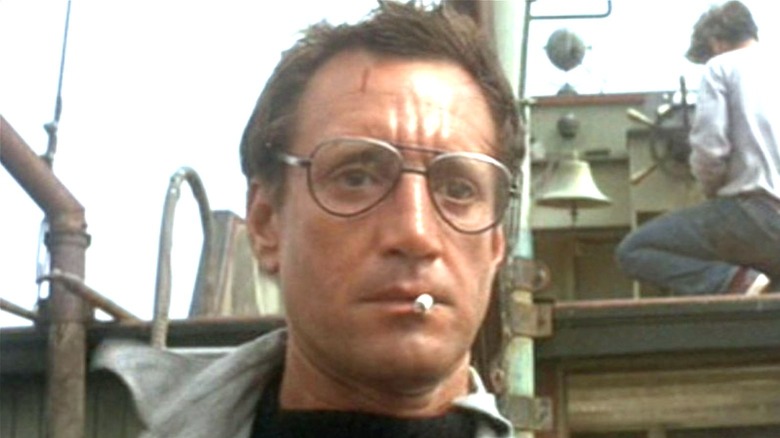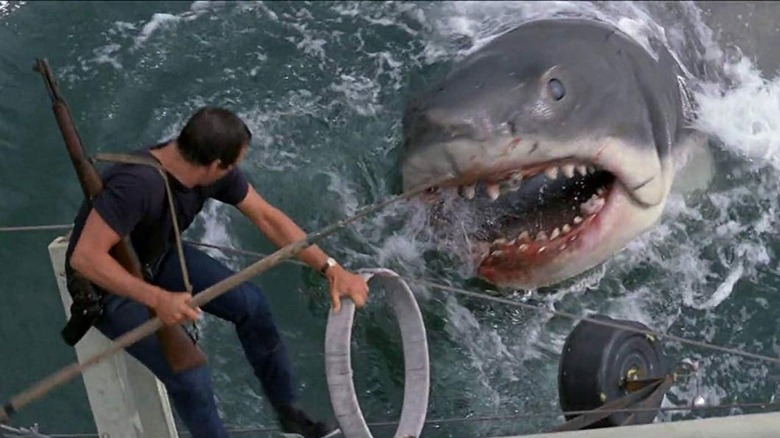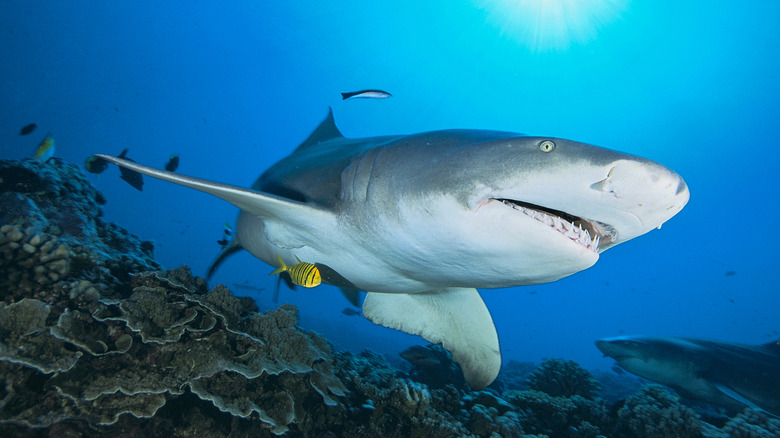Is Jaws Based On A True Story?
Have you ever Googled the odds you'll be the victim of a shark attack? According to The Florida Museum, it's much more likely you'll struck by lightning, killed in a biking accident, or die from a fall. When it comes to shark attacks, though, you're looking at a one in 3.7 million chance it's ever going to happen. So why is everyone so freaked out by the possibility? There's only one explanation: the 1975 classic "Jaws." Whether you've seen it or not, it lives in the zeitgeist, a lingering threat we can't help but react to on a primal level. Likely or unlikely, shark attacks do happen, our protective egos remind us, interpreting "Jaws" as much more than mere entertainment.
Given that shark attacks are rare but real, it stands to reason "Jaws" could be a true story. But is it actually based on real life events? That's a bit complicated.
The White House started a "war on sharks"
Some accounts indicate the plot of "Jaws" was inspired by events that took place on the New Jersey coast in 1916 (via History). First, a shark attacked a man, with the shark biting the man's leg as he swam in the water. Despite a dramatic rescue by onlookers, he bled to death on shore. Five days later, another man was killed when a shark bit off his legs. A few days after that, two young boys were attacked by sharks — one was killed, and the other had his leg bitten Was it all the work of the same murderous creature?
One thing seemed clear to the angry community: Sharks were the enemy. Mobs of shark hunters set off for the beach. Frightened citizens urged the government to jump in. President Woodrow Wilson organized an actual "war on sharks."
But before the government took much action, one of the shark hunters apparently caught the offending creature. After killing a particular shark, he reportedly gutted it to find human bones inside. After that, the attacks ceased. Fact vs. fiction aside, it was all great stuff for the perfect horror movie plot decades later.
The truth is sometimes a slippery thing
Long after the 1916 incidents, but still well before the movie came out, a writer named Peter Benchley got interested in sharks. In 1964 (via Narratively), he learned of a 4,550 pound great white caught near Montauk, on Long Island. He visited the town to research all things shark, going so far as to cage dive and meet a few face-to-face. Then, he wrote his 1974 novel: "Jaws." "Without realizing it, I tapped a nerve in people," he said. "In an environment that we choose to go, there is an actual genuine danger that something could eat you. And what a horrible way to go."
The book captured Hollywood's attention and became the inspiration for the Steven Spielberg film. However, it's fair to say the movie isn't simply an adaptation of Benchley's book. It also draws from the events of 1916.
The shark attacks that inspired the film are true. But is it realistic to fear death by shark every time you risk a dip in the sea? Not at all, and Benchley lived to regret his portrayal of his book's villain. As he continued his research, he learned sharks are actually victims of inhumane hunting practices. He become an activist fighting on their behalf.
If Benchley wrote "Jaws" today, it would tell a very different truth and perhaps, lead to a very different movie. "We must begin to think differently about these wonderful creatures," he said. "And see them for what they really are."


